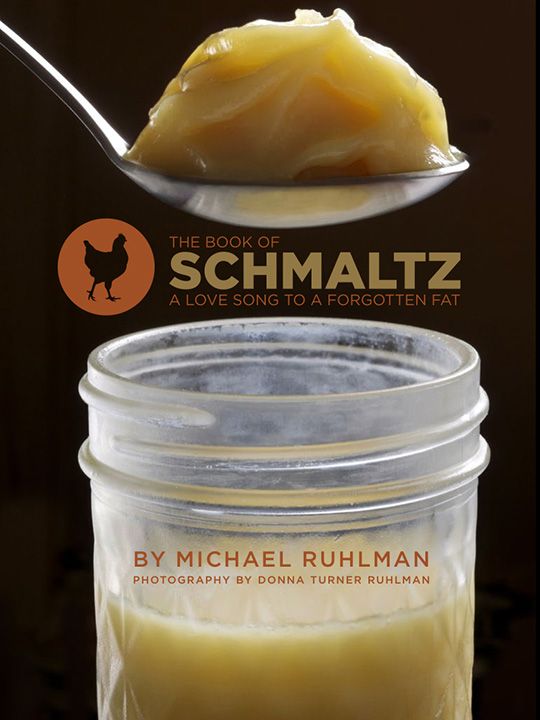We're sitting down with our favorite writers and cooks to talk about their upcoming cookbooks, their best food memories, and just about anything else.
Today: We talk to Michael Ruhlman about his new app, The Book of Schmaltz.


Michael Ruhlman first went to a cooking school to report on the narrative of a chef's life. He stayed for the cooking, and then, he started living a chef's life of his own. Since, he's penned enough books for us to have a whole Ruhlman-dedicated shelf: we're constantly using Ratio as a reference, and more recently, we're having dreams of Italian countryside self-sufficiency as we flip through the pages of Salumi. These days he's turned his attention -- and ours -- to a forgotten fat.
We caught up with Michael Ruhlman to chat about The Book of Schmaltz: A Love Song To a Forgotten Fat, the self-publishing experience, and why it is that we should be remembering rendered chicken fat when we turn to the stove.
1. Why dedicate a whole cookbook to schmaltz?
I write a lot about fat, its importance in a land where it's vilified. I love cooking with duck fat. Schmaltz was a fat that really hadn't been looked at full on. When my neighbor, Lois Baron, left a party early saying that the High Holy days approached and she had to go make schmaltz, I knew the time had come to explore it with Lois as my guide.
2. Is there a history behind this unsung ingredient?
Schmaltz was indeed maligned by the very people who once relied on it absolutely, the Ashkenazi Jews, who invariably talked about it as a heart attack food or an artery clogger. In fact, it's one of the great cooking fats on earth and responsible for elevating the most humble of foods (liver, matzo, egg) to heavenly levels.
3. Why should we be using it in our kitchens? What's an example of a dish that benefits from its flavor over a more neutral fat?
There are many reasons, a main one which I mentioned above. But people should cook with it, first off, for flavor -- and the kind of flavor that only schmaltz, chicken fat and skin rendered with onion, can deliver. It's a flavor you can't buy. Chopped liver is amazing when made with schmaltz, but so are potatoes roasted in schmaltz; they take on a crispness that vegetable oil doesn't give you and the flavor is, again, incomparable. Another important reason to use it is to avoid waste. It's a reminder that if we're going to kill an animal for our food, we are obliged to use all of it, not throw half of it away. Save the fat from a roast chicken and save the livers and make chopped liver from the cooking fat. (And make stock from the carcass, in a low low oven, overnight.)
4. Describe the publishing process of Schmaltz. What drove you to self-publish, and what has come of that decision?
I'm not very interested in traditional cookbooks anymore. I'm interested in experimenting and seeing how new media can present and spread information about food and cooking. My wife Donna (and Nick Kokonas of Chicago, co-owner of Alinea) pressed me to self-publish. So we hired a designer, a copy editor, and a digital consultant who formatted it in Adobe InDesign and uploaded it as an app. Donna's photos are exquisite on the iPad retina screen -- she said they inspired her. She was so astonished by their clarity and accuracy; often colors get changed in the printing process, but not here.
I felt I could now do everything a publisher can, so why be content with a 15% royalty on jacket price, the old-fashioned book model, when I could make 70% of the profits from a digital product and control all aspects of the project? The one problem is that the project turned out so well, and has such a broader market for people who don't use electronic devises (Lois, for instance). So I've given control over to Little Brown who will publish the hardcover version this fall, something I have no interest in (publishing and distributing hardcover books). It's part of a six project deal that I've done with Michael Sand at Little Brown, and I'm very happy to be with this excellent publishing house. I'll still experiment with apps on the side, and I still maintain all app rights for Schmaltz (unprecedented, according to Sand), but financially, food apps alone are not money makers. One day they will be, but this is a whole different discussion.
5. Now onto you. What's your go-to, comforting meal after a long day of work?
Pasta carbonara is a go-to easy satisfying comfort meal for me. I'll be roasting a chicken tonight, with baked potatoes, and roasted brussels sprouts. 2 pans, one oven, and everything done in an hour without effort.



See what other Food52 readers are saying.